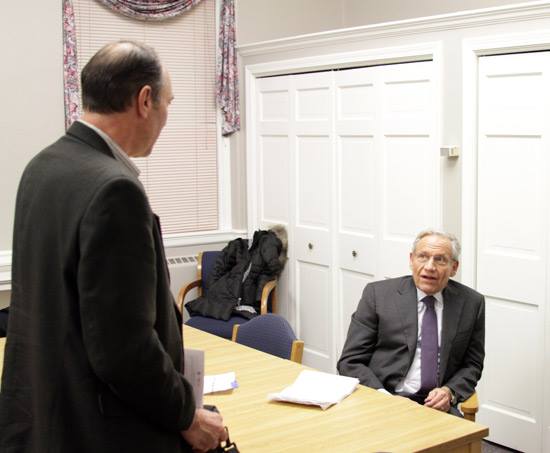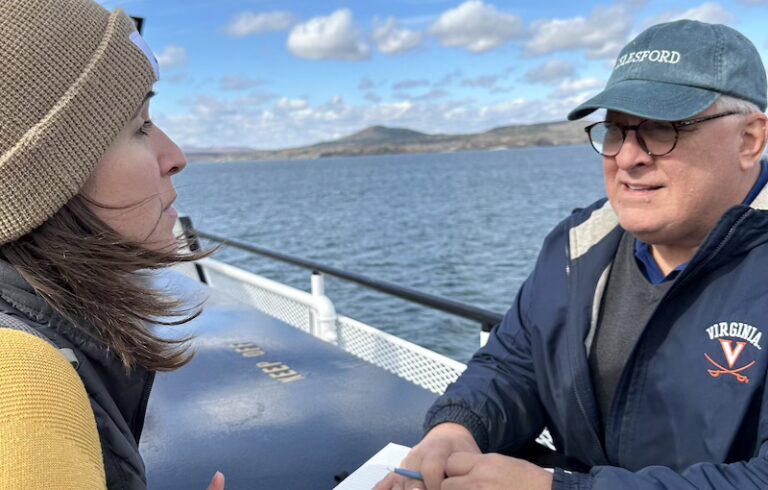I met Bob Woodward in 2012. Colby College gave him the Elijah Parish Lovejoy award for his life’s work in journalism and I was covering it for the Bangor Daily News that weekend.
When I think of who inspired my career choice, George Reeve and Bob Woodward come to mind.
Reeve played Clark Kent/Superman in the 1950s TV show, which was popular as a re-run when I was growing up in the early 1960s. One episode had Superman, still donning his tights and cape, rush into an empty newsroom to bang out a story on Clark’s manual typewriter. Very cool.
A Colby staffer approached me and asked if I wanted to talk to Woodward privately. I flagged down Jesse…
But Woodward inspired a more mature career pathway. I was home sick in 9th grade for a few days when the Watergate hearings began, and I was glued to the TV, though I didn’t understand much of the discussion. I was 15 when Nixon resigned.
When the film All The President’s Men was released, I convinced my brother to drive us to the theater to see it. What a great job! Part detective, part moral crusader for Truth, Justice, and the American Way, as the Superman TV show used to put it.
And the weapon of choice? Words, with which I had an early affinity.
One summer during my college years, I worked at an all-night gas station. From 1 a.m. to 5 a.m., it got mighty slow, so I had time to read, and worked my way through All The President’s Men.
I think I chickened out from the daunting task of breaking into the business. Instead, I taught high school English and then worked as an employment counselor for community action agencies. Important work, of course, but not aligned with my passion.
Back to Woodward.
That weekend was stressful. The small staff of reporters working weekends meant I had to cover and produce a fair amount of content.
On the bright side, the BDN hired my son Jesse to video and shoot photos of the event, so it was a thrill to be working with him.
I sat quietly, waiting for the talk to begin. A Colby staffer approached me and asked if I wanted to talk to Woodward privately. I flagged down Jesse and we were escorted to a small room. I told Woodward I was one of his stepchildren, telling him about reading the book.
“It’s a great business, isn’t it?” he said. I remember hesitating a second or two before agreeing. The business, as has been well documented, was facing significant challenges then. And now.
Cars, real estate, and what used to show up in the classifieds are now sold online for a fraction of what newspaper ads cost. With web access free in those days, subscription revenue was plummeting.
Yes, it’s a great job, but it was becoming precarious, with lay-offs and down-sizing.
A few months later, I learned the Island Institute was looking for an editor for The Working Waterfront and Island Journal. Landing this job was a godsend.
I’ll admit it was a welcome downshift. But within a month, I realized this newspaper, already widely circulated and much read, provided an opportunity. “I think I can make some noise with this paper,” I remember telling my wife.
At that Colby event, Woodward recounted sitting next to Al Gore at a dinner shortly after George W. Bush defeated him in the election. Why didn’t Woodward “go after” Bush, Gore asked, the way he “went after” Nixon?
Well, Woodward explained, because journalists aren’t charged with picking winners and losers.

The term “storytelling” is bandied about in journalism circles these days, but I’m not fond of it. At our best, we let other people tell their stories. Yes, we like narratives and look for conflict and resolution as we craft our work, but facts and context are key, and they are best presented plainly and clearly.
This is the last issue of The Working Waterfront for which I am editor, though I may contribute in retirement, if our new editor deems that valuable. I never did get to dash into a newsroom in tights and cape to write a story, but it’s been a wonderful career, 38 years in all. Thank you for reading.
Tom Groening will retire in mid-January. He still may contacted at tgroening@islandinstitute.org.





